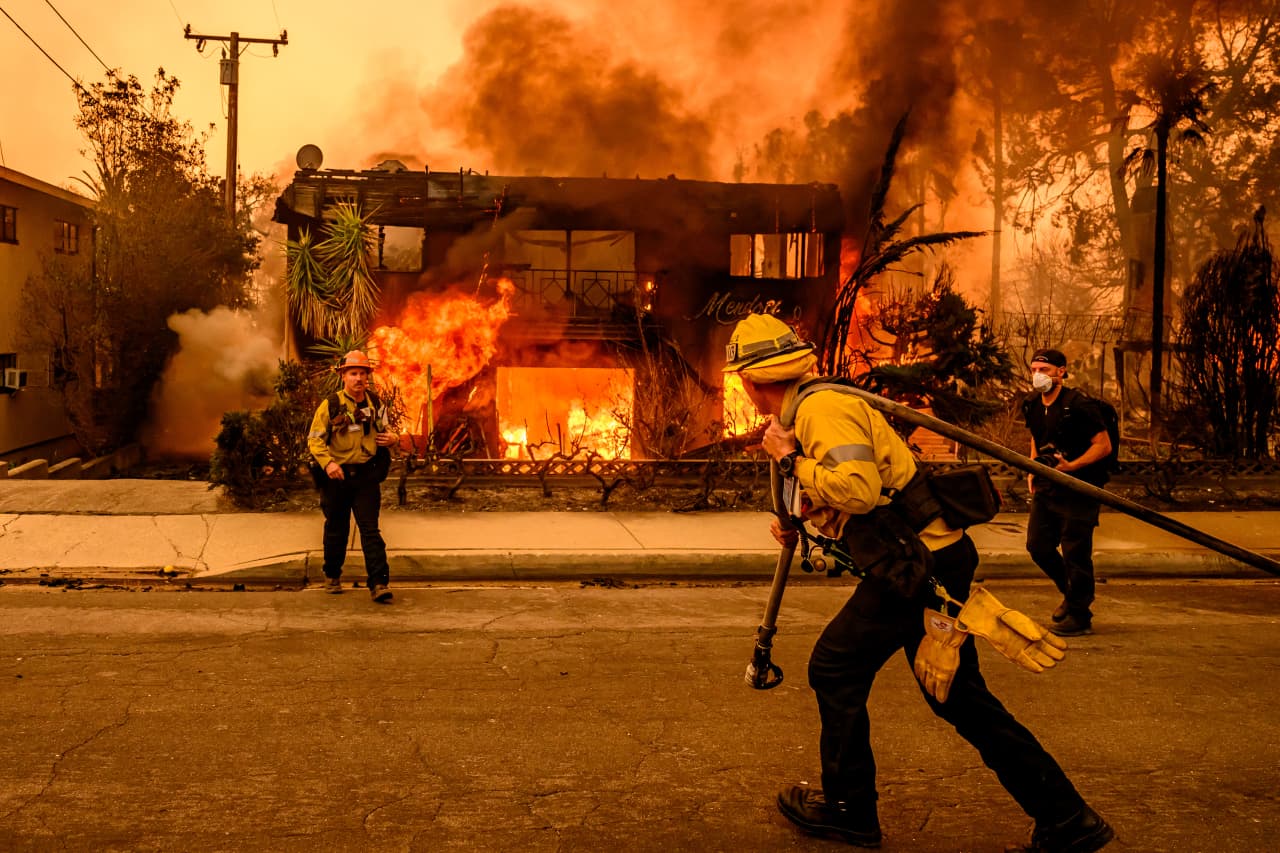Weekly roundup of local and international climate change news for the week of July 29 to Aug. 4, 2024.

Article content
Here’s all the latest news concerning the climate crisis, biodiversity loss, and the steps leaders are taking to address these issues.
In climate news this week:
• UN chief calls for global action to tackle extreme heat
• Olympics affected by heavy rain and brutal heat wave
• Sardinia in state of emergency because of drought
• Environmental groups push Ottawa for stronger action on climate change after Jasper wildfires
Advertisement 2
Article content
Human activities like burning fossil fuels and farming livestock are the main drivers of climate change, according to the UN’s Intergovernmental Panel on Climate Change. This causes heat-trapping greenhouse gas levels in Earth’s atmosphere, increasing the planet’s surface temperature.
The panel, which is made up of scientists from around the world, has warned for decades that wildfires and severe weather, such as B.C.’s deadly heat dome and catastrophic flooding in 2021, would become more frequent and more intense because of the climate emergency. It has issued a “code red” for humanity and warns the window to limit warming to 1.5 C above pre-industrial times is closing.
Once again, Canada is experiencing a catastrophic wildfire season. Although wildfires usually ignite because of lightning or human activities, heat waves and drought from human-caused global heating dry out vegetation and make it easier for fires to start and spread, according to the Canadian Climate Institute.
For example, during the eight days of the 2021 heat dome in B.C., the number of wildfires rose from six to 175, with fires that spread during that time consuming nearly 79,000 hectares, including the entire town of Lytton.
Advertisement 3
Article content
But it’s not too late to avoid the worst-case scenarios. According to NASA climate scientists, if we stopped emitting greenhouse gases today, the rise in global temperatures would begin to flatten within a few years. Temperatures would then plateau but remain well-elevated for many centuries.
Check back every Saturday for more climate and environmental news or sign up for our Climate Connected newsletter HERE.

Climate change quick facts:
• The Earth is now about 1.2 C warmer than it was in the 1800s.
• 2023 was hottest on record globally, beating the last record in 2016.
• Human activities have raised atmospheric concentrations of CO2 by nearly 49 per cent above pre-industrial levels starting in 1850.
• The world is not on track to meet the Paris Agreement target to keep global temperature from exceeding 1.5 C above pre-industrial levels, the upper limit to avoid the worst fallout from climate change including sea level rise, and more intense drought, heat waves and wildfires.
• On the current path of carbon dioxide emissions, the temperature could increase by as much as 4.4 C by the end of the century.
• In April, 2022 greenhouse gas concentrations reached record new highs and show no sign of slowing.
• Emissions must drop 7.6 per cent per year from 2020 to 2030 to keep temperatures from exceeding 1.5 C and 2.7 per cent per year to stay below 2 C.
• 97 per cent of climate scientists agree that the climate is warming and that human beings are the cause.
Article content
Advertisement 4
Article content
(Source: United Nations IPCC, World Meteorological Organization, UNEP, NASA, climatedata.ca)

Latest News
Opening week at the Olympics co-stars heavy rain, soaring temperatures
If it was not the water, it was the heat.
Those two elements came to define the first week of competition at the 2024 Olympics in Paris, first with the rain that drenched the Opening Ceremony, then with the heat that has tormented competitors and fans in the stands.
On Tuesday, British tennis player Jack Draper complained of “drinking hot water” during his second-round singles match on the clay at Roland Garros. He lost — 7-6 (7-3) 3-6 2-6, to American Taylor Fritz – and spent much of his time during changeovers standing at a water fountain and draping bags of ice over his face to stay cool.
Heavy rainfall caused delays in triathlon, with Olympic organizers attributing the issue to climate change. The rain – falling last Friday and Saturday – amounted to what the city would normally expect to receive for the entire month of July.
The shorter version? It resulted in high E. coli levels in the Seine, leading to a safety-related postponement of the men’s triathlon.
Advertisement 5
Article content
“Climate change crashed the Olympics,” climate scientist Friederike Otto said on the app formerly known as Twitter. “The world watched athletes swelter in 35°C heat. If the atmosphere wasn’t overloaded with emissions from burning fossil fuel, Paris would have been about 3°C cooler and much safer for sport.”
Read the full story here.
—National Post

UN chief calls for action to tackle deadly extreme heat
Secretary-General António Guterres has called for urgent action to address extreme heat around the world.
Billions of people are facing an extreme heat epidemic, wilting under increasingly deadly heatwaves, with temperatures topping 50 C around the world, he said in a statement.
Guterres said extreme heat is increasingly tearing through economies, widening inequalities, undermining the sustainable development goals and killing people.
Heat is estimated to kill almost half a million people a year, or about 30 times more than tropical cyclones, according to the UN.
Guterres said governments must boost protection for the most vulnerable, scale-up heat health-warning systems, step up protections for workers, and boost the resilience of economies and societies using data and science.
Advertisement 6
Article content
“The disease is the addiction to fossil fuels. The disease is climate inaction. Leaders across the board must wake up and step up,” he said.
—Tiffany Crawford

Environmental groups push Ottawa for stronger action on climate change after Jasper wildfires
Eighty organizations are demanding Canada take stronger action to reduce emissions in the wake of the devastating Jasper wildfires, penning an open letter to Canada’s federal and provincial leaders.
The letter, signed by groups including Greenpeace and the David Suzuki Foundation, urge “decisive action” to reduce emissions by regulating oil and gas companies and financial institutions with holdings in those companies.
The letter comes amid lingering concerns over the wildfire in Jasper National Park, which flared up again Thursday and Friday as temperatures reached 30 C and above. Jasper Mayor Richard Ireland said Thursday that conditions over the weekend “are all prescriptions for fanning the flames.”
The letter cites frustration with the federal government that it’s moving too slowly on its proposed oil and gas emissions cap — regulation that’s received significant pushback from the oilsands and Alberta government.
Advertisement 7
Article content
“Governments in Canada must put the health of people in Canada and our communities above fossil fuel profits — before another town or city burns or floods due to the impacts of climate change,” the letter reads.
Read the full story here.
—Calgary Herald
Hot weather for B.C. long weekend expected to dry out forest fuels
The B.C. Wildfire Service says it now considers eight of the more than 300 fires burning across the province as wildfires of note, as crews prepare for hot and dry conditions in the south of the province over the upcoming long weekend.
The Dunn Creek fire, about 100 kilometres north of Kamloops, and Sitkum Creek fire, northeast of Vernon, were added to the list of six wildfires of note, which are either highly visible or pose a threat to public safety or infrastructure.
The wildfire service says a “drying trend” in the south comes after a couple days of high temperatures and no rain, conditions that are expected to dry out forest fuels and make them more susceptible to burning.
Environment Canada issued more than 20 heat warnings in the province, saying an “extended period” of hot weather is expected for much of the southern Interior region covering the Fraser Canyon, the Okanagan Valley, the South Thompson, Boundary, the West and East Kootenays, and several other parts of B.C.
Advertisement 8
Article content
The wildfire service says B.C.’s north will be hit with thunderstorms and rain, although a campfire ban has been lifted in time for the long weekend in the Prince George and northwest fire centres.
It says parts of the south will see increased lightning strikes, and that people should be wary of “any activity that could introduce sparks into the forest.”
Read the full story here.
—The Canadian Press
Sardinia declares state of emergency for drought
Sardinia declared a state of emergency on Tuesday because of persistent drought and lack of drinking water, according to a report on Euronews.
The report says the tourist hub has not seen rain in weeks as temperatures continue to rise above 40 C.
The scarcity of water has been drastically affecting agricultural and industrial activities, the tourism sector and the daily lives of Sardinian citizens, according to the report.
The emergency declaration will remain in force until Dec. 31.
Sicily is also dealing with severe drought and heat, according to this Associated Press report.
—Euronews, AP
Amnesty International names Wet’suwet’en chief Canada’s first prisoner of conscience
Advertisement 9
Article content
Amnesty International is calling for the release of a B.C. First Nations chief who is serving two months of house arrest, naming him Canada’s first prisoner of conscience.
Chief Dsta’hyl was arrested in 2021 for breaching a court order not to impede construction of the Coastal GasLink liquefied natural gas pipeline, and is currently confined to house arrest for contempt of court.
The chief, who also goes by the name Adam Gagnon, represents the Likhts’amisyu clan within the Wet’suwet’en Nation.
“The extraction industries have been protected by the government and encouraged to just keep raping the land,” Dsta’hyl said at a press conference, where he appeared by video from his home.
“It’s up to us as Wet’suwet’en people to protect the land,” he told reporters Wednesday.
Amnesty argued Canada has unjustly confined the chief, and others who defend their land and rights during a climate emergency.
Read the full story here.
—The Canadian Press

B.C. salmon group offers recommendations for after wildfire devastates salmon habitat
The Pacific Salmon Foundation recently released a list of possible human actions to rehabilitate salmon habitat damaged by 2023’s destructive wildfire season in B.C.
Advertisement 10
Article content
With the prediction of “larger, more intense and more frequent” wildfires in the future, the Pacific Salmon Foundation is concerned for B.C.’s wild salmon habitat and the watersheds the fish depend on.
“Individual fires have … engulfed entire watersheds at scales and intensities that signal a possible shift in the disturbance patterns experienced in the 20th century,” says the Foundation’s Playbook to Guide Landscape Recovery Strategies and Priorities for Salmon Habitat Following Major Wildfires.
“The resultant alterations in soils and the loss of vegetation combine to influence stream flows and temperatures, channel morphology and water quality, and these impacts threaten to push some salmon populations beyond their ability to adapt,” says the guide. “This is especially true for those populations that are already ‘at risk’ and limited by factors worsened by wildfire.”
Read the full story here.
—Alexandra Mehl
Scottish beach eroding by 7 metres a year
A beach in north-east Scotland is eroding rapidly owing to climate change, leaving a town at risk of flooding, according to a report in The Guardian.
Advertisement 11
Article content
The reports says a local study of the rate of erosion at Montrose predicts that 120 metres would be lost over 40 years, an average of three metres a year.
It adds that people in Montrose are concerned about the storm season in autumn, as last year’s record-breaking storms caused the beach to erode seven metres in the space of a year, more than four metres more than scientists predicted.
The Guardian quoted one councillor as saying he thinks Montrose could be under water in three years if nothing is done.
—The Guardian
Bookmark our website and support our journalism: Don’t miss the news you need to know — add VancouverSun.com and TheProvince.com to your bookmarks and sign up for our newsletters here.
You can also support our journalism by becoming a digital subscriber: For just $14 a month, you can get unlimited access to The Vancouver Sun, The Province, National Post and 13 other Canadian news sites. Support us by subscribing today: The Vancouver Sun | The Province.
Article content



















Discussion about this post